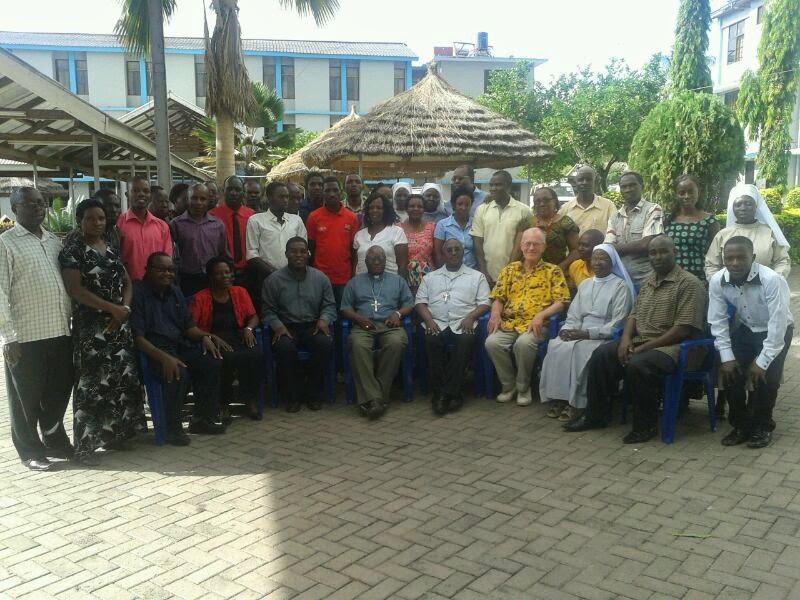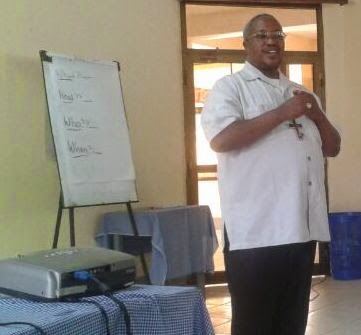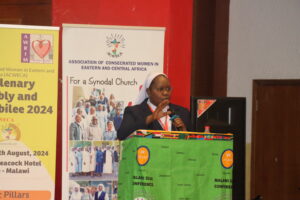TANZANIA: Catholics are Called to Reflect on the Importance of Various Ministries of the Church

 |
| Group Photo of the Participants |
Participants
of Small Christian Communities have resolved to encourage their communities (SCCs)
to reflect on the importance of the various ministries at the grass-root level
through catechetical formation, preparation for sacraments, solidarity with
others and giving witness to the Gospel of Jesus Christ as it is only they can
make themselves be involved in building the ecclesial community as the Family
of God.
of Small Christian Communities have resolved to encourage their communities (SCCs)
to reflect on the importance of the various ministries at the grass-root level
through catechetical formation, preparation for sacraments, solidarity with
others and giving witness to the Gospel of Jesus Christ as it is only they can
make themselves be involved in building the ecclesial community as the Family
of God.
Information received from Mwanza,
Tanzania said 47 Participants who were the representatives from the eight
dioceses from Mwanza Metropolitan(Mwanza
Archdiocese and the dioceses of Bukoba, Bunda, Geita, Kayanga, Musoma,
Rulenge-Ngara and Shinyanga)in northwestern Tanzania attended the workshop on the theme
“Small
Christian Communities (SCCs) Embrace the Word of God”at the St.
Dominic Pastoral Centre in Mwanza, Tanzania from19 to 22 May, 2014.
Tanzania said 47 Participants who were the representatives from the eight
dioceses from Mwanza Metropolitan(Mwanza
Archdiocese and the dioceses of Bukoba, Bunda, Geita, Kayanga, Musoma,
Rulenge-Ngara and Shinyanga)in northwestern Tanzania attended the workshop on the theme
“Small
Christian Communities (SCCs) Embrace the Word of God”at the St.
Dominic Pastoral Centre in Mwanza, Tanzania from19 to 22 May, 2014.
The participants included: one
Archbishop, one Bishop, 11 priests, 5 religious sisters, 21 laymen and 8
laywomen.
Archbishop, one Bishop, 11 priests, 5 religious sisters, 21 laymen and 8
laywomen.
The
workshop was sponsored by the Pastoral Department of the Tanzania Episcopal Conference
(TEC) and the Pastoral Department of Mwanza Archdiocese in conjunction with the
Pastoral Department of the Association of Member Episcopal Conferences in
Eastern Africa (AMECEA).
workshop was sponsored by the Pastoral Department of the Tanzania Episcopal Conference
(TEC) and the Pastoral Department of Mwanza Archdiocese in conjunction with the
Pastoral Department of the Association of Member Episcopal Conferences in
Eastern Africa (AMECEA).
This
is the fourth of a series of SCCs Workshops in the nine AMECEA countries. This
SCCs Workshop mainly in Swahili was facilitated by Bishop Method Kilaini, Father
Febian Pikiti, Father Joseph Healey, MM, Sister Rita Ishengoma, STH and Father
Gallus Marandu, CSSP.
is the fourth of a series of SCCs Workshops in the nine AMECEA countries. This
SCCs Workshop mainly in Swahili was facilitated by Bishop Method Kilaini, Father
Febian Pikiti, Father Joseph Healey, MM, Sister Rita Ishengoma, STH and Father
Gallus Marandu, CSSP.
In the spirit of “learning by doing” participants formed five
Small Communities with specific Patron Saint names:St. John XXIII, St. John
Paul II (two small communities), St. Method and St. Peter for two separate
sessions:
Small Communities with specific Patron Saint names:St. John XXIII, St. John
Paul II (two small communities), St. Method and St. Peter for two separate
sessions:
-
Lectionary-based
faith sharing on the Gospel of the following Sunday: Sixth Sunday of Easter (John14: 15-21). -
Using
the SEE – JUDGE – ACT reflection
method/process on challenges/problems in the general society in Tanzania (“Bribery”
and “Selfishness”) and in the Catholic Church(“Couples Who Cannot Receive
Communion Because Their Marriages Have Not Been Sacramentalized,” “Lack of Dialog
and Consultation,” “Misuse of Government Privileges on Importation,”“Not
Witnessing to the Truth,” “Poor Attendance at SCCs Meetings” and “Youth Not Getting
Married in Church.”
Participants also met two times in small groups by diocese
for discussion and planning.
for discussion and planning.
The SCCs Workshop
identified the following as some of the challenges for SCCs to be very
effective:
identified the following as some of the challenges for SCCs to be very
effective:
- The
positive action and presence of the parish priest and/or his co-workers is
motivating to members of SCCs. However, in some parishes they are not
forthcoming. - Although
men are sympathetic with the SCCs and are ready to make the needed
financial contributions, they do not attend the weekly meetings. - Most
of the young men and women do not see the need to attend SCCs. - In
the city mobility is very high due to transfers and change of rented
houses. This disrupts the smooth running of the SCC especially if the
leaders are affected. - Some
Small Christian Communities have grown too big and the members are very
reluctant to divide. This affects the good functionability of the SCCs. - Some
families have nowhere to welcome the SCC members because they live in one
room or the landlord is hostile to such meetings.
The interesting historical
presentation by Bishop Method Kilaini, the Auxiliary Bishop of Bukoba Diocese,
provided guidance for the participants to formulate resolutions for the way
forward.
presentation by Bishop Method Kilaini, the Auxiliary Bishop of Bukoba Diocese,
provided guidance for the participants to formulate resolutions for the way
forward.
- Small
Christian Communities as builders of the church in the neighbourhood.
Through formation
workshops for the clergy, religious and laity there is a need to emphasise that
SCCs form bonds of neighbourhoods of people who know one another and relate to together.
As they meet regularly in different houses, the members come to know each and
enter in other peoples’ homes and cultivate friendships. They form the Family
of God that shares the joys and sorrows, the riches and worries and learn to
help each other in need.
workshops for the clergy, religious and laity there is a need to emphasise that
SCCs form bonds of neighbourhoods of people who know one another and relate to together.
As they meet regularly in different houses, the members come to know each and
enter in other peoples’ homes and cultivate friendships. They form the Family
of God that shares the joys and sorrows, the riches and worries and learn to
help each other in need.
- Small Christian Communities promote Christian life.
Participants
resolved to encourage SCCs to reflect on the importance of the various
ministries at the grass-root level through catechetical formation, preparation
for sacraments, solidarity with others and giving witness to the Gospel of
Jesus Christ. In this way they will be involved in building the ecclesial
community as the Family of God.
resolved to encourage SCCs to reflect on the importance of the various
ministries at the grass-root level through catechetical formation, preparation
for sacraments, solidarity with others and giving witness to the Gospel of
Jesus Christ. In this way they will be involved in building the ecclesial
community as the Family of God.
- Small
Christian Communities promote collaborative leadership from the grassroots.
Highlights of the workshop included:
- A participatory and interactive
style of teaching and learning focusing on evaluation, revitalization and
the joy of pastoral ministry and evangelization. This included lively
songs on community and unity; LectioDivina
style of prayer; SCC-style masses; and learning a new vocabulary in
developing SCCs as a new way of being church. - Presentation and discussion on the
historical significance of the Lake Zone. The first African Cardinal,
Laurean Rugambwa, came from Bukoba. The first Tanzanian President, Servant
of God Julius K. Nyerere, came from Musoma. The very beginning of SCCs in
Eastern Africa (and perhaps the whole of English-speaking Africa) can be
traced back to the parishes in the Luo-speaking Deanery (especially
Nyarombo, Ingri, Masonga and Kowak Parishes) in North Mara in Musoma
Diocese in northwestern Tanzania in 1966. During the Seminar Study Year
(SSY) in Tanzania in 1969 coordinated by the Bukumbi Pastoral Institute in
the then Mwanza Diocese the concept and praxis of SCCs that were then
called “local Church communities” were first articulated as a
priority in both rural and later urban parishes. These Tanzanian case
studies and examples were first documented in articles in the journal Service
published by the Bukumbi Pastoral Institute that is now called TAPRI
(Tanzanian Pastoral and Research Institute) and is part of St. Augustine
University (SAUT) with headquarters in Mwanza. In the early 1970s
Tanzanian Bishop Christopher
Mwoleka(who died in 2002),
the Bishop of Rulenge Diocese in northwestern Tanzania,began to develop his vision and praxis of small
communities based on Bible
Sharing and practical action. He is considered the founder of SCCs in
Tanzania. - Sessions on identifying and
analyzing the practical obstacles, difficulties and problems in making
SCCs strong and permanent and finding concrete solutions. Some of these
challenging issues are connected to money matters (including the dangers of the frequent churchdonation); youth
participation; importance and quality use of the Bible; and marriage and family concerns.
 |
| Most Rev Jude Thaddeus Ruaichi of Mwanza |
In
his remarks Archbishop Jude Thaddeus Ruwa’ichi, the Archbishop of Mwanza
Archdiocese, emphasized that four priorities in the Catholic Church in Tanzania
today come together for “their opportune time” that is like a kairos moment: These are the Word of God
(Bible); the New Evangelization; Small Christian Communities; and the
family.
his remarks Archbishop Jude Thaddeus Ruwa’ichi, the Archbishop of Mwanza
Archdiocese, emphasized that four priorities in the Catholic Church in Tanzania
today come together for “their opportune time” that is like a kairos moment: These are the Word of God
(Bible); the New Evangelization; Small Christian Communities; and the
family.
At the end of
this SCCs workshop in the Lake Zone it was recommended that for leadership to
be more effective, we must start from the grassroots level so that the building
of pastoral structures begins from the SCCs. In this way, the ideas and
opinions initiated in the SCCs are taken up to the parish, diocesan and
national levels by their leaders and those ideas coming from the top
communicate down to Small Christian Communities members on the grassroots
level.
this SCCs workshop in the Lake Zone it was recommended that for leadership to
be more effective, we must start from the grassroots level so that the building
of pastoral structures begins from the SCCs. In this way, the ideas and
opinions initiated in the SCCs are taken up to the parish, diocesan and
national levels by their leaders and those ideas coming from the top
communicate down to Small Christian Communities members on the grassroots
level.
SOURCE: Fr Joseph Healey and AMECEA Pastoral Department


